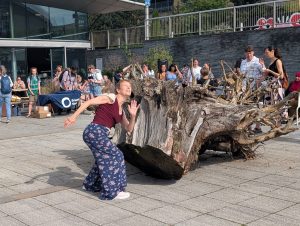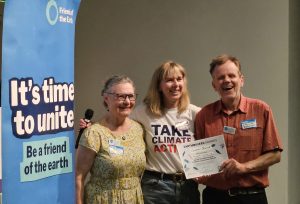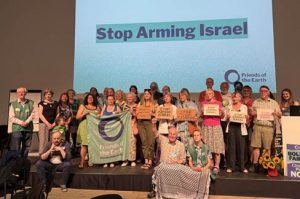
“Gratitude is liberating. It is subversive. It helps us realise that we are sufficient, and that realization frees us.” — Joanna Macy
In a world often overshadowed by environmental and social crises, the North East Summer Gathering, held on Saturday, June 21st, at the Baltic Centre for Contemporary Arts in Gateshead, served as a powerful testament to Joanna Macy’s profound insight. It was a day where gratitude for our interconnectedness with the Earth and each other fuelled collective action, demonstrating that even amidst immense challenges, choosing to embrace sufficiency and freedom can unlock immense power for healing and change.
The day began with a panel discussion, “Our struggles are deeply linked – What does a truly connected environmental and social justice movement look like and how can we work to meet each other’s needs?” This session featured diverse voices from the North East’s social justice movement.
Food and Solidarity contributed to the discussion, emphasizing the crucial role of nutritious, sustainable food in fostering resilient communities and addressing social inequalities.
West End Refugee Service (WERS), a Newcastle-based charity, shared insights from their vital work. WERS provides essential support and advocacy for people seeking sanctuary, covering housing, education, health, and legal advice, and serving as a key “Wellbeing Hub.” Their participation underscored the immediate human impact of displacement and the need for welcoming structures.
North East Young Dads and Lads (NEYDL), an award-winning parenting support charity, offered their unique perspective. NEYDL empowers marginalised young fathers (under 25) across the North East, enabling them to play active, meaningful roles in their children’s lives. Their work highlights the importance of family well-being within the broader social justice framework.
Dr. Michael Richardson from Newcastle University. As a Senior Lecturer in Human Geography, Dr. Richardson shared research on masculinities, social justice, and community engagement. He discussed his innovative collaboration with the Baltic Centre for Contemporary Art, where his Innovation and Knowledge Exchange Sabbatical explores how cultural institutions can foster “radical hospitality.” This initiative aims to deepen community group engagement, using his work with NEYDL as a compelling case study. A notable aspect of this collaboration includes his work with urban beekeeping: managing beehives on the Baltic roof as part of the “Post-industrial Pollination” project. This project, which has evolved into the larger “Birds, Bees, Bikes and Trees” initiative, involves young dads from NEYDL learning about bees, sustainability, and urban biodiversity, while also engaging with contemporary art and culture.
This panel collectively affirmed that environmental degradation disproportionately affects vulnerable communities, and effective climate action must inherently integrate principles of equity and justice.
A midday break featured a delicious lunch from the Samosa Sisters, a non-profit catering project. The Samosa Sisters are dedicated to raising funds for the relief of poverty and empowering vulnerable women, particularly those with no recourse to public funds. Their work focuses on building strong, supportive networks and overcoming isolation and discrimination within BAME women’s communities, embodying the very spirit of social solidarity discussed in the morning.
The afternoon offered choices for deeper engagement. In the main room, the War and Geos project, a collaborative research initiative primarily led by Newcastle University (with Dr. Mark Griffiths as Principal Investigator) and partners including PENGON – Friends of the Earth Palestine and Purdue University, held a session [add placeholder for other zoom participants]. This project investigates the deeply intertwined and “doubly destructive” relationship between warfare and the Earth (“geos”). It examines the environmental legacies of militarism, tracing the impact from the initial extraction of raw materials (like heavy metals) used in weapons, through their manufacturing, and finally to their deployment in conflict zones.
To quote one of those attending, ‘An excellently curated event, thank you. The work on water and soil contamination in Palestine undertaken by PENGON, Friends of the Earth Palestine, was part of the connections we feel & need to take part in.’
A key focus of the research is on the lasting environmental and public health consequences of these materials in war-affected landscapes, specifically studying sites in Gaza and Iraq. Speakers, including Newcastle University’s Mohamed El-Shewy, shed light on these devastating environmental consequences of conflict, particularly in the Gaza Strip, and the global implications for Earth’s ecosystems and human well-being. This powerfully linked geopolitical struggles to ecological destruction.
In an adjacent cinema room, Darlington Friends of the Earth presented ‘Growing Green with Nature,’ their film on sustainable farming, followed by a discussion on sustainable farming, offering local solutions and practical steps towards a more regenerative relationship with the land and improvements in food nutrition.

Laura Hawken and Colin Elliot from Greener Berwick (greenerberwick.org.uk) accepted the “Earthmovers celebration award” which acknowledged ground-level environmental action with Greener Berwick a recipient for their highly successful monthly Repair Cafe. The Repair Cafe, held on the last Saturday of every month from 10 am to 1 pm at The Salvation Army Church Hall, 53 Church Street, Berwick. Again exemplifying their commitment to sustainability and community engagement. This celebration honoured the spirit of such awards and the vital contributions of groups like Greener Berwick to local climate action.
Terry Smith, from Alnwick Friends of the Earth, accepted the award for his boundless enthusiasm for climate action. He has created and distributed his Tipping Point Challenge game, and trained a number of groups across the country. He runs a climate club in the High School in Alnwick, and has an infectious and open minded way of greeting the world.
The afternoon’s collaborative spirit continued with roundtable sessions, offering two 30-minute discussions with a swap after 30 minutes. Attendees chose from critical campaigns that highlight key moments in local and national climate action:
Stop Incineration North East (groups.friendsoftheearth.uk/groups/sine-stop-incineration-north-east) focused on their grassroots movement opposing new incinerator projects in the region. Discussions revolved around the health impacts of incineration, the economic pitfalls of long-term waste-burning contracts, and the urgent need to shift towards genuine circular economy principles, advocating for increased recycling and waste reduction rather than destructive disposal methods.
The Big Climate Plan campaign session (groups.friendsoftheearth.uk/take-action/demand-big-climate-plan) engaged participants in advocating for a bolder and fairer national climate strategy. This included discussions on the legal obligation for a new UK climate plan by autumn 2025, the need for comprehensive policies across all sectors, and ensuring the transition benefits all communities with warmer homes, green jobs, and cleaner air.
The Planet Over Profit campaign session (groups.friendsofthearth.uk/take-action/introducing-our-planet-over-profit-campaign) delved into the global impacts of corporate supply chains, particularly on deforestation, human rights, and climate change. Discussions highlighted the push for new UK legislation to hold companies accountable for environmental harm and human rights abuses, emphasizing the importance of ethical consumption and supporting frontline communities.
The Divestment – a key campaign moment session (www.divest.org.uk) explored the growing movement to withdraw investments from fossil fuel industries. Participants discussed the financial and ethical arguments for divestment, particularly concerning local council pension funds and other public and private institutions, advocating for redirecting investments towards sustainable alternatives and accelerating the clean energy transition.
Beyond the structured discussions, a crafting session and the opportunity to explore the Baltic gallery provided alternative, creative outlets for engagement, allowing for reflection and informal networking.
The main programme concluded with a solidarity photo action, symbolizing collective strength. The gathering continued into the evening, celebrating Refugee Week. Artists Roua Horanieh and Henna Asikainen gave a poignant talk on their exhibition, “To Own Both Nothing and the Whole World,” a project exploring migration and displacement. The day culminated with fire pits, food, drum circles, crafts, and an incredible dance performance by Dora Frankel, commissioned by Newcastle Climate Action. Frankel’s work, often exploring the intersection of environment and people, provided a moving and joyful close.

See also
How to Engage without Alienating: Framing the Activism Narrative
How activists can effectively gain public attention without alienating potential supporters, strategically communicate their message, use authentic narratives, and balance disruptive tactics with broader public appeal to drive meaningful change.
Where next? Use the links below:
